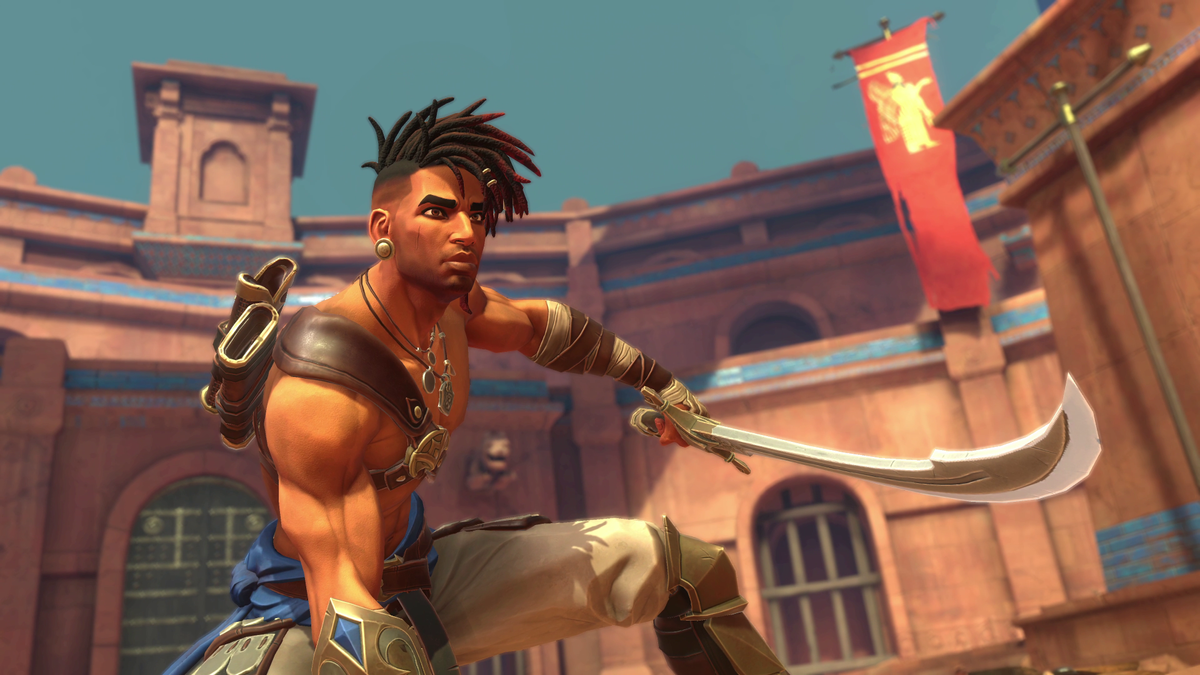Larian director of publishing Michael Douse, never one to be shy about speaking his mind, has spoken his mind about Ubisoft’s decision to disband the Prince of Persia: The Lost Crown development team, saying it’s the result of a “broken strategy” that prioritizes subscriptions over sales.
Prince of Persia: The Lost Crown is quite good. PC Gamer’s Mollie Taylor felt it was dragged down by a very slow start, calling it “a slow burn to a fault” in an overall positive review, and it holds an enviable 86 aggregate score on Metacritic. Despite that, Ubisoft recently confirmed that the development team has been scattered to the four winds to work on “other projects that will benefit from their expertise.”
This, Douse feels, is at least partially the outcome of Ubisoft’s focus on subscriptions over conventional game sales—the whole “feeling comfortable with not owning your game” thing espoused by Ubisoft director of subscriptions Philippe Tremblay earlier this year—and the decision to stop releasing games on Steam, which is far and away the biggest digital storefront for PC gaming.



It depends on your definition of ownership. If having perpetual access to a product is enough then yes. But we aren’t allowed to, say, disassemble a game and use it’s assets to make something of our own. As opposed to say a spoon. Nobody can tell me how I can and can’t use my spoon.
It’s not realistic to demand to own games in the same way as a spoon any time soon. It is, however, pretty reasonable to demand you own games like you’d own a book. You can chop up a book and use it to make a paper maché dog, but you can’t chop up the words within to make a new derivative book (or just copy them as its to get another copy of the same book except for a single backup that you’re not allowed to transfer to someone else unless you also give them the original). The important things you can do with a book but not a game under the current system, even with Gog, are things like selling it on or giving it away when you’re done with it and lending it out like a library.
About a hundred years ago, book publishers tried using licence agreements in books to restrict them in similar ways to how games and other software are restricted today, but courts decided that was completely unreasonable, and put a stop to it. In the US, that’s called the First Sale Doctrine, but it has other names elsewhere or didn’t even need naming. All the arguments that applied to books apply equally well to software, so consumers should demand the same rights.
Oh yeah, I understand. I was just trying to describe the difference between ownership and a perpetual license in overly simplified terms. Also, can you think of any examples of digital goods that retain first sale doctrine? With physical disks at least a second hand market still exists for that very reason, but I can’t think of any digital media that allow resale. I would love to be wrong!
Microsoft actually was going to allow that starting with the Xbox One.
IIRC, the way they were going to implement it would be to make a license transferrable X times a year. They were also going to allow free sharing of digital games to friends that had been on your friends list for at least 30 days.
But then people freaked out over it when they showed it off at the Xbox One reveal due to the fact that digitally-purchased games would have always-online requirements to keep people from duplicating games by installing them, disconnecting from the internet, then logging in elsewhere and sharing the game with a friend.
So after the backlash they pulled the plan. And that really stinks because they still have always-online requirements for digital games. You just can’t sell or share them now.
Sorry to necro this but I just saw in the latest LTT vid that apparently Microsoft did go through with this plan? They were talking about it in the context of the diskless xbox that just released. https://answers.microsoft.com/en-us/xbox/forum/all/how-to-transfer-content-licenses/7ac76f4e-c7e4-4153-8824-1e424478b02d
You can make mods for many games and many people do.
Yes, but you can’t use their assets to make other games or products.
You can add whatever you want to Skyrim, but you can’t add Skrim to whatever you like.
You can. If your project gets big enough, they’ll take legal action. But you can definitely get away with fan projects.
Also with physical objects, you can’t legally do whatever you want either. There’s nothing physically stopping you from taking a piece of wood and carving it into any shape you like. But if you make a big enough project out of it, you may eventually run into legal issues. It could be related to IP like patents, trademarks, or copyright, or it could be something like safety.
It’s ok to make a hamburger for your friends at a cookout, but if you start selling your burgers or distributing them in mass, your government may expect you to follow food safety laws, and you can’t market your burgers as “McDonalds”.
Having to fly under the radar or risk financial ruin doesn’t sound like ownership to me.
Then I guess none of us really own anything in a society.
That’s their goal. “You’ll own nothing and be happy.”
Believe it or not, “It’s only illegal if you get caught” isn’t how copyright works.